Tag: technicians

To properly operate an equine hospital, each member of the team must have the same goal in mind: high quality health care. Strong teamwork and leadership are essential, and Palm Beach Equine Clinic is fortunate to have our Equine Hospital led by Holly Hall. Born and raised in West Palm Beach, Florida, Holly has been an indispensable member of Palm Beach Equine Clinic family for over five years.
Get to know PBEC Hospital Manager Holly Hall
What is your background with horses?
My parents introduced me to horseback riding lessons when I was young. I originally rode English for a few years before finding that I had more of a desire for speed. I started barrel racing when I was eight years old and haven’t stopped since. My parents bought me my first horse when I was about nine years old, and soon that one horse turned into multiple horses. Throughout my high school years, I went to school in the mornings, worked at the barn in the evenings, and barrel raced on the weekends.
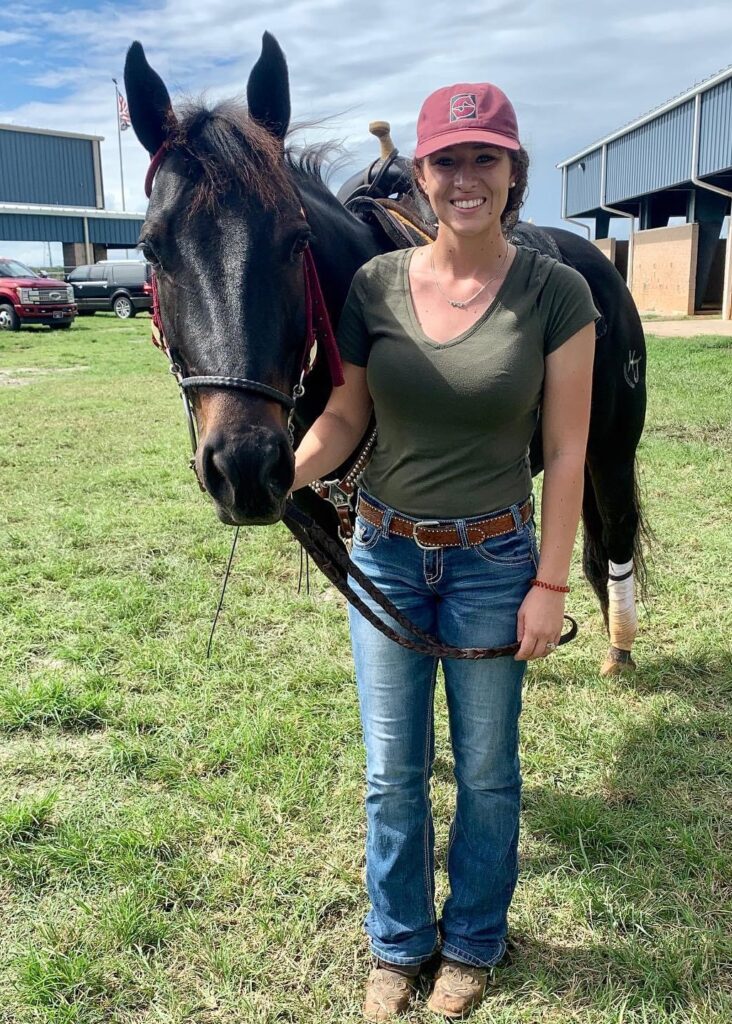
What was your original role at Palm Beach Equine Clinic?
Originally, I joined PBEC as a part time night technician and have since worked my way up to Hospital Management. Since my first days at PBEC, I have always loved the endless knowledge and experiences that I encounter and grow from every day. I immediately took an interest in emergency and surgical cases. I took every opportunity I could to experience and learn as many new things as possible about equine health.
Although my official position has always been with the hospital, I have gained experience in other aspects of the clinic throughout my time here. I am one of PBEC’s primary surgical technicians, have skills in preforming laboratory procedures, have worked with multiple doctor’s as their ambulatory technician, traveled to horse shows with our team, transported emergencies in our ambulance, and much more! I am always eager to lend a hand and take advantage of any opportunity to learn something new.
What are your daily responsibilities?
Throughout the day I manage patient care, hospital organization and our team of hospital technicians. I am responsible for updating patient’s Clinician Orders as per doctor’s orders and scheduling each patient’s treatment plan for the next 24 to 48 hours. The hospital technicians use these Clinician Orders to treat each patient and update medical records. Along with the technicians, I assist in completing treatments, procedures, surgeries, laboratory tasks, assist with admittance and prepare hospital patients for discharge. I also ensure that the hospital is well-stocked for any patient needs.
I am responsible for managing the technicians and their work schedules as we are an Emergency Hospital. The hospital is staffed with skilled technicians 24 hours a day, 7 days a week, 365 days a year. This includes all holidays and throughout storms. Our hospital team is responsible for the care of all PBEC patients, including the Intensive Care Unit (ICU)/surgery, Isolation (Quarantine), Annex (horse show) and Imaging stalls. Although our responsibilities seem endless, our hospital staff has a great system of communicating and we are dedicated to working hard for our patients and clients.
What aspects of Hospital Management do you most enjoy?
I really enjoy the intensity of helping with emergency cases and working in a surgical setting. Being a part of the initial work up, diagnostics, and watching our patients progress on their road to recovery is very satisfying. You never stop learning in medicine, and I appreciate the endless opportunities that I have to learn.

It is also interesting to be able to work with such a wide variety of horses. As technicians first and foremost, we must have the skills as horsemen to recognize the horse’s behaviors for personality traits versus potential changes to the state of their health. Carefully recognizing these symptoms and abnormal behaviors contributes to each patient’s treatment and enables us to make sure the horses are as comfortable and happy as possible.
Although our work is focused on the horses, we work with a large team of people to provide with best care possible. All our staff –veterinarians, technicians, interns, residents, specialists, surgeons, laboratory, pharmacy, imaging, and office administration –contribute to high quality patient care. I enjoy being a part of this team and watching all our efforts come together for our patients and client needs.
When not in the Equine Hospital, what do you enjoy doing or where can we find you?
My husband and I love being outdoors. We typically find ourselves out in the woods, on the water, or (of course) on the back of a fast horse! We mostly enjoy air boating and barrel races during our free time. Enjoying the company of our close family and friends, while doing what we love the most.
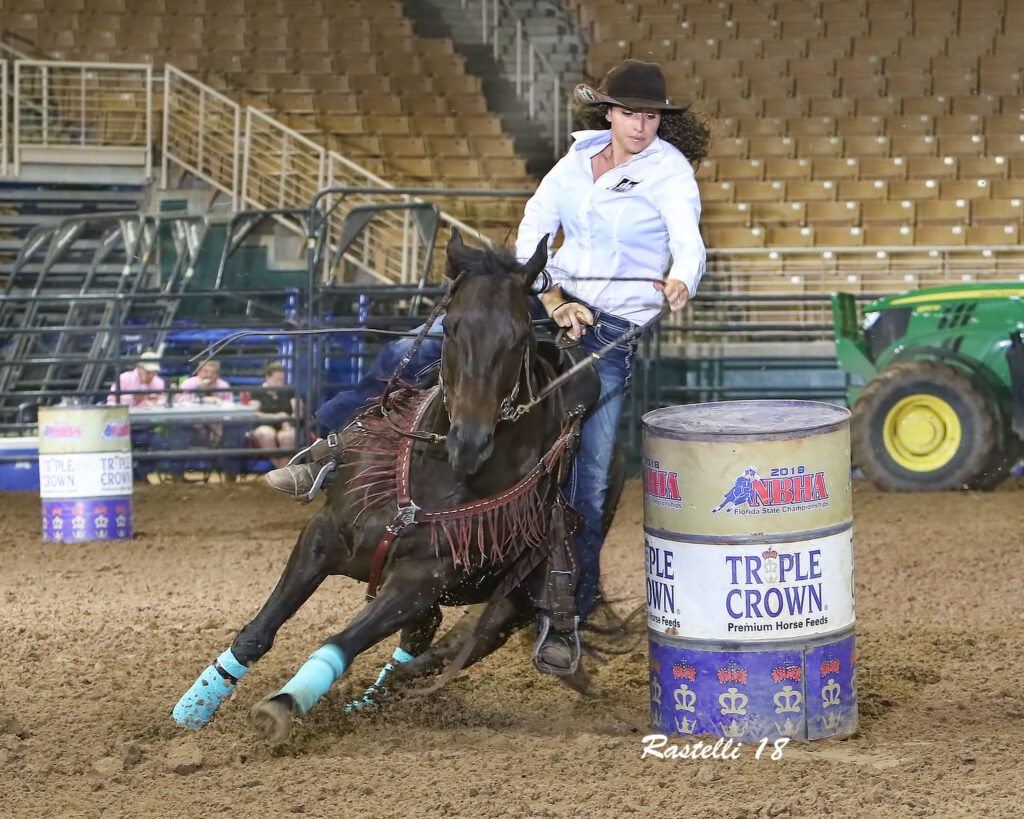


Congratulations to Palm Beach Equine Clinic’s own Kim Emmons on her completion of the American Association of Equine Veterinary Technicians (AAEVT) Equine Certificate Program!

Kim has over 25 years of experience as a certified veterinary assistant, but she was eager to advance her knowledge through this additional certification. Now, she is formally recognized as an equine specialist in the field, distinguished by the American Association of Equine Practitioners (AAEP) and the AAEVT. She also serves as an AAEVT Regional Contact for Florida, Alabama, Georgia and South Carolina. The AAEVT Regional Contacts, along with the Board, meet monthly via zoom call to discuss training and education, local and regional happenings in the equine veterinary industry, business plans, and more industry news.
To acquire this certification, Kim completed courses on equine diseases and parasitology, nursing care, pharmacology, surgical assistance and anesthesia, laboratory diagnostics, imaging modalities and much more.
Palm Beach Equine Clinic has been incredibly fortunate to have Kim as part of our team for over 22 years. Her steadfast dedication to providing the highest quality patient care, contributions to hospital management, and willingness to lend a helping hand in any situation are qualities that make Kim an incredible person and asset to PBEC. Please join our team in congratulating Kim on her accomplishment!
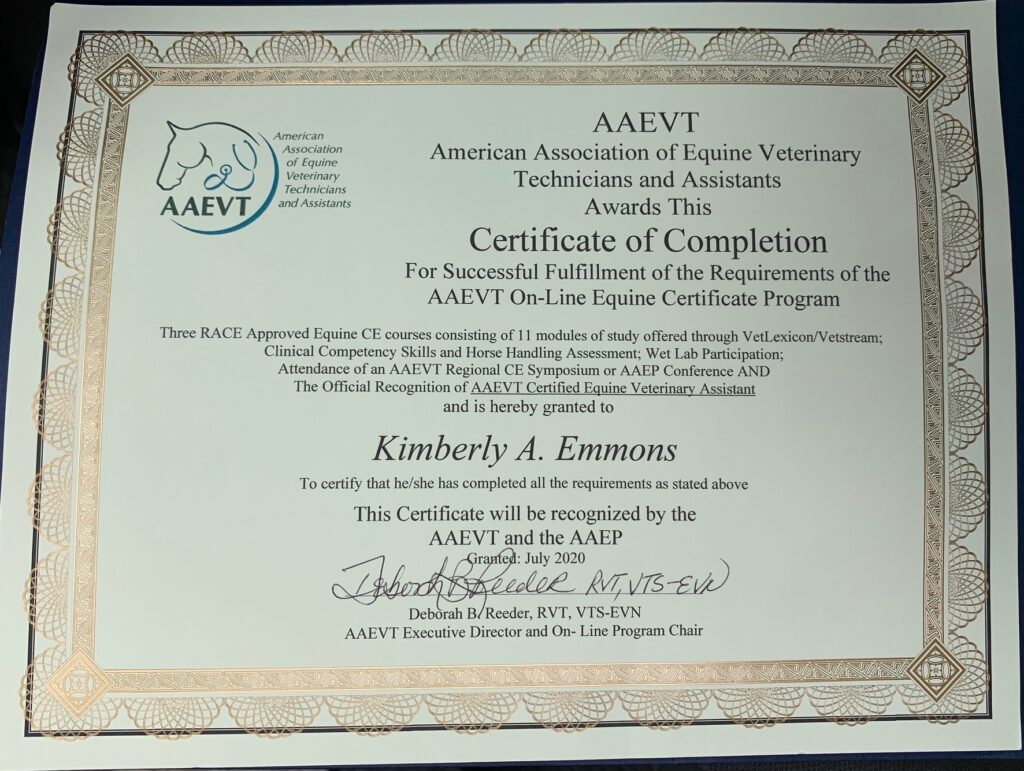
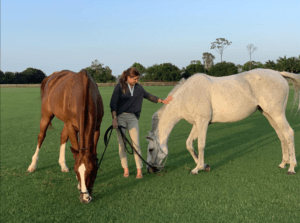
The Palm Beach Post recently featured our amazing veterinary technician Brittany Halstead and her dedication to finding second careers for retired polo ponies through ReplayPolo, a 501c3 organization.
For Veterinary Technician Brianna Ploskunak, 22, of Royal Palm Beach, FL, horses are a passion. But not in the way you may think. Raised by a mother who rode and competed, Ploskunak found an early infatuation with all things equine that eventually drew her to veterinary medicine. At Palm Beach Equine Clinic, where she has been a part of the team since 2016, Ploskunak is one of 30 veterinary technicians who manage the hands-on care of equine patients and support the veterinarians in all aspects of the day-to-day operations. She works directly under Dr. Bryan Dubynsky, who specializes in sport horse medicine within the bustling competition atmosphere of Wellington, FL.
We caught up with Veterinary Technician Brianna Ploskunak to find out more:
What was your first introduction to horses?
My mom used to be a rider herself, so I grew up constantly surrounded by horses. She [rode] dressage for many years. I quickly followed in my mother’s footsteps and fell in love with the animal and the sport, although I never competed myself. Being around horses my entire life, I felt the need to do whatever I could to advance the health of each and every horse that I see. It means a lot to me to be able to contribute to their fast and healthy recovery.
What do you enjoy most about being a veterinary technician?
The number one thing I enjoy about treating horses is being a part of their journey from start to finish. Nothing brings me more joy than to see a horse that I have been working with through their recovery return to the show ring happy and healthier than ever before. These animals never cease to amaze me with their way of getting back onto their feet after an injury.
What is your average day like at Palm Beach Equine Clinic?
On an average day at Palm Beach Equine Clinic, I first meet Dr. Dubynsky to go over the morning appointments and gather all of the equipment and resources we need for the upcoming day. As we finalize our schedule, I work on completing all open items such as billing and inventory. We then prepare the truck to leave for the day and travel to a variety of different appointments throughout the Palm Beach County territory. Appointments vary depending upon the condition of the patient but often include radiographs and ultrasounds to injections and vaccinations. After we have seen all patients for that day, we return to the clinic and re-stock the inventory we have used that day. Lastly, we prepare for the following day by composing a new schedule of appointments and/or on-call horse show responsibilities.
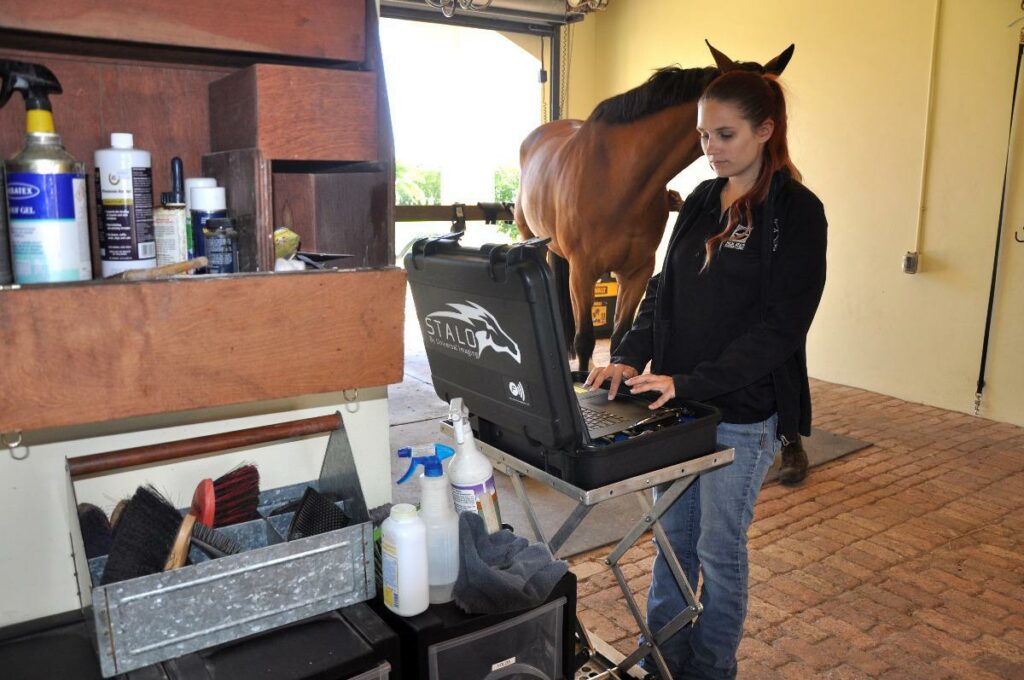
What is your favorite part about being a member of the Palm Beach Equine Clinic team?
My future goal is to continue to learn from the many experienced veterinarians I work alongside every day and build my experience and knowledge in the industry. That’s probably my favorite part as well; working alongside such talented and genuine people willing to give me multiple opportunities to learn and grow as a professional. It’s very hard to find a group of superiors willing to go the extra mile to teach young employees.
I have been able to experience some amazing things at Palm Beach Equine Clinic, including the intricacy of equine surgery and how the work of equine surgeons can bring a struggling horse back to top health. I really enjoy sports medicine because it’s not always sick horses – there is always something you can do to help the horse get back to peak performance. Whether it be radiographs, ultrasounds, injections etc., there is always something that can be done for the benefit and of the health of the horse.
What can we find you doing when you are not at Palm Beach Equine Clinic?
When I’m not working, you can catch me racing go-karts and spending quality time with my family, especially my one-year-old nephew, Elijah!
Palm Beach Equine Clinic (PBEC), based in Wellington, FL, is home to world-renowned surgeons, board-certified specialists, and state-of-the-art diagnostic technology. In addition, PBEC is home to over 30 veterinary technicians who provide comprehensive support to the veterinarians they work alongside.
PBEC takes pride in the diligence of the technicians who work in collaboration with the veterinarians to maintain the daily functionality of the clinic.
The typical responsibilities of an equine veterinary technician include:
- Manage veterinarians’ schedules
- Stock veterinarians’ mobile unit with supplies, equipment, and medications
- Accompany veterinarians on barn calls and emergency response
- Consult on cases with a veterinarian
- Care for and monitor horses admitted to the on-site clinic hospital
- Plan patient care and follow-up
- Oversee billing and invoices
According to Dr. Marilyn Connor, veterinary technicians are the right hands of the doctors they work with. PBEC employs over 30 technicians and the hands-on experience they have access to gives them invaluable opportunities to learn.
“One thing that is special about PBEC is that we have a full staff of technicians day and night,” said Dr. Connor, who first joined PBEC as an intern and now works as a full-time veterinarian. “They are the ones feeding and caring for horses, administering medications that do not require a doctor, and assisting veterinarians on cases. During the peak of the season, there are roughly 40 doctors with very diverse caseloads for technicians to learn and gain experience from.”
Yessica Arrua is one PBEC technician who has become an accomplice for veterinarian Dr. Natalia Novoa and the clinic in general. Arrua, 22, was born in Buenos Aires, Argentina, but now calls Florida home and is a pivotal part of the PBEC team.
5 Questions for Palm Beach Equine Clinic Yessica Arrua
1. How did you first get involved with horses?
I have been around horses since I was three years old. Both my parents have been working with horses since before I can remember. My dad works with polo ponies and my mom with dressage horses. They both traveled to Florida to pursue work with horses here and that is how I came to be a resident of Wellington and a team member with Palm Beach Equine Clinic.
2. What are your day-to-day responsibilities at PBEC?

I work with Dr. Natalia Novoa, who focuses on both traditional veterinary medicine and alternative therapies like chiropractic adjustments and acupuncture. My day-to-day responsibilities include making sure our truck is stocked with the equipment and medications that we may need. I also look after all the invoices in our system on a monthly basis. Overall, my role is to ensure Natalia has everything she needs and is prepared for our farm call visits.
3. What do you enjoy most about working with equine veterinarians and the horses they treat?
Other than being around horses every day, which is the best part of my job, I really enjoy being able to experience all the different types of cases that come through Palm Beach Equine Clinic. Especially during the winter season, we see so many interesting cases from emergencies to routine exams.
4. Do you have a favorite case?
My favorite cases to work on are the ones where horses have anhidrosis, which we see often in the Florida heat.
There is no universal or proven treatment for anhidrosis, but people often try salts, electrolytes, thyroid supplements, and even beer. But, Dr. Novoa has been able to help these horses with acupuncture. We had one case where the horse didn’t respond to any traditional treatments but started sweating right away during our first acupuncture treatment.
What is Anhidrosis? According to the American Association of Equine Practitioners (AAEP), anhidrosis is a compromised ability to sweat in the face of exercise or high ambient temperatures. This is a potentially dangerous condition for horses, especially working horses, because they thermoregulate (maintain a consistent body temperature) primarily through sweating.
5. What can we find you doing when you aren’t working at PBEC?
You will find me at the beach, reading, and spending time with my family!
Originally hailing from Chicago, Illinois, Brittany Cain attended Southern Illinois University before moving to Florida and joining the staff of Palm Beach Equine Clinic as the manager of the Nuclear Scintigraphy department.
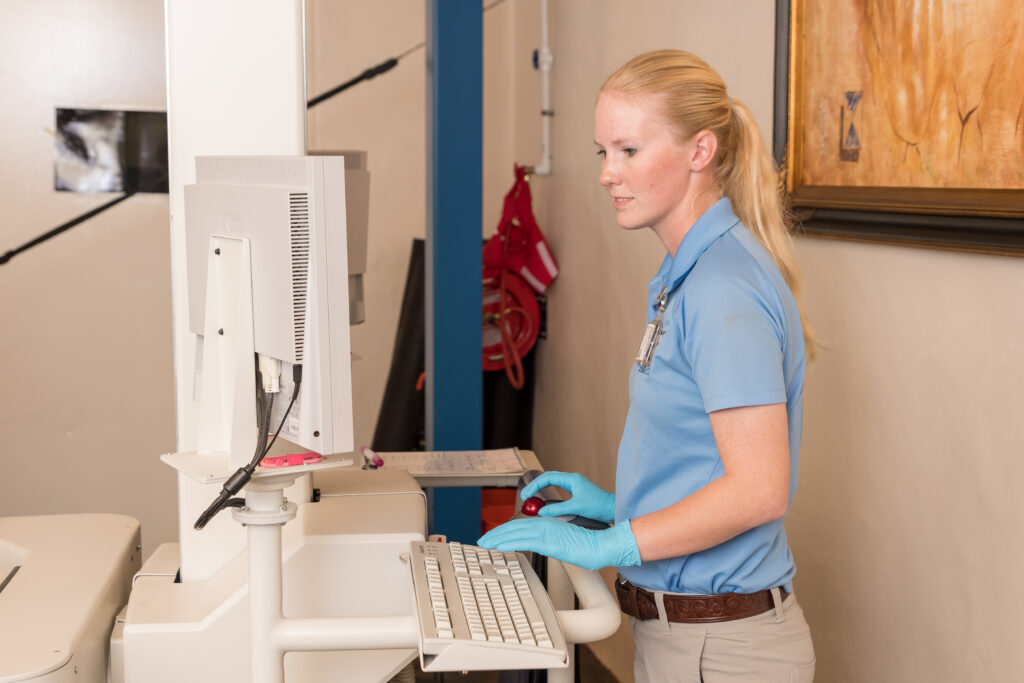
What is your background with horses?
Growing up, my parents actually had nothing to do with horses; we’re from the city of Chicago, so they were not horse people at all. I was just always the horse obsessed little girl – you know, the one horse girl in the class! When I was about 13, I started volunteering at a therapeutic riding center, so I got a lot of hands on experience there. I learned to ride a little bit and worked with the special needs kids. That was great.
When I was 18 years old and had my first paying job, I was able to afford actual riding lessons and it just went from there!
I did a lot of work on Standardbred breeding farms up in Illinois. I foaled out a lot of babies and trained a lot of weanlings. Many of those yearlings went on to be race horses. I did that for three years during college, and that was a really neat experience.
What led you to pursue a career as veterinary technician?
Throughout high school, I was always obsessed with horses. I volunteered all of my free time to be at the barn. I knew I wanted to do something that I loved, so I found Southern Illinois University, and they had a bachelor’s degree in equine science. I applied to one school, got in, and it was perfect. I didn’t have to find a bunch of schools; I just went to the one that I wanted right away, and I knew what I wanted to do!
What led to your focus on the Nuclear Scintigraphy Department in particular?
I’ve always had a strong interest in the anatomy of horses. I knew a lot of equine anatomy from college where I took many courses that covered the musculature anatomy as well as skeletal. In addition, working with all of the Standardbred yearlings was great experience for working with the two and three-year-old racehorse patients that see here at Palm Beach Equine Clinic.
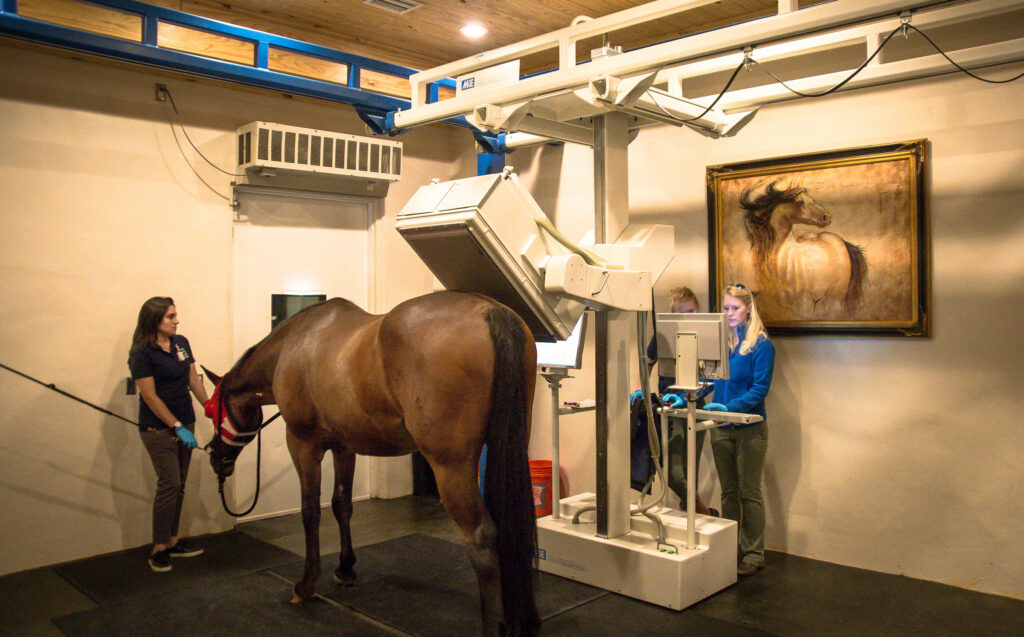
What is your typical day like at Palm Beach Equine Clinic?
As the manager of the Nuclear Scintigraphy Department, I have the patients in the scanning area for bone scans. Myself and technicians will bring the horse into the area, I will take their temperature, pulse, and respiration checks, and then I will place a catheter and inject the radioactive isotopes.
It takes two hours for the isotope to settle into the bones, and then I can begin the bone scan. I usually inject the isotope, and then I do a lot of paperwork in between the two hours since there’s a lot of tracking and recording for dealing with radioactive materials. Then the scan begins. The horse comes into the room; they’re lightly sedated. The scans usually take from one to two hours or, for a full body scan, anywhere from two to four hours. It’s a lot of keeping the horse comfortable, getting all of the images that are needed, and making sure that the images are high quality. Usually during the busy winter season, we have anywhere from two to three horses a day so it keeps me very busy.
What do you enjoy most about working at Palm Beach Equine Clinic?
I love the variety of patients that we see. We get cases of racehorses, polo ponies, barrel racers, top show jumpers, hunters and dressage. It’s really neat seeing all of these talented and often very expensive horses.
Have you had any standout or favorite moments since you joined the Palm Beach Equine Clinic team in 2015?
We went down to Miami for the Longines Global Champions Tour to assist in taking the arriving horses off the airplanes. I helped by taking temperatures, pulse, and respiration checks on all of the competition horses. It was really cool seeing the caravan from the airport to the show grounds and just how it’s set up on Miami Beach.
What do you enjoy doing when you’re not working?
My fiancé and I go fishing a lot usually at the beach or off a pier; we definitely enjoy spending our free time fishing.
Cassidy Hoff is a veterinary technician and assistant to Dr. Richard Wheeler of Palm Beach Equine Clinic. Originally from Middletown, CT, Cassidy joined the team at Palm Beach Equine Clinic in April of 2015.

What is your background with horses?
I’ve always had a passion for horses and I started riding lessons when I was seven years old. I attended Centenary College (now a University) in Hackettstown, NJ, and rode competitively as a student. I graduated in 2012 with a Bachelor of Science in Equine Studies with concentrations in Riding Instruction and Therapeutic Riding Instruction, receiving an additional PATH certification (Professional Association of Therapeutic Horsemanship International).
How did you start at Palm Beach Equine Clinic?
I moved to Florida after graduating from college in 2012 and landed my first job as the head instructor of a therapeutic riding center. I worked there for about three years. Through that experience, I realized that I had a strong interest in the veterinary side of the equine industry. Dr. Greenfield was the center’s primary veterinarian, which is how I learned about Palm Beach Equine Clinic. I applied for a job at Palm Beach Equine Clinic and the timing was perfect to work for Dr. Wheeler.
What is your typical day like?
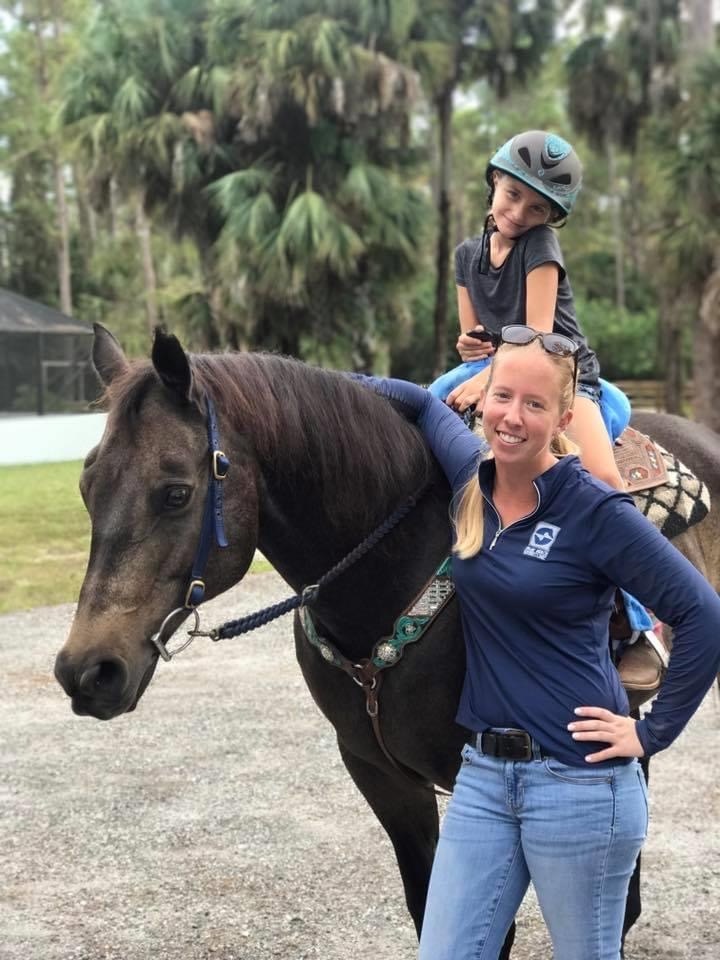
We usually work six days a week, but during the busy winter season, seven days a week is more likely. Typically, my day begins around 8 a.m. and continues until we are finished with our client appointments. At the end of our day, I send out reports to clients we worked with throughout that day which contain discharge instructions for the findings from each appointment.
Dr. Wheeler mainly focuses on sport horse medicine. I assist him with lameness evaluations, joint injections, ultrasound exams, nerve blocks, and taking radiograph images. I am also responsible for keeping the truck well stocked and organized, replacing medications we use throughout the day and administrative work. Additionally, we complete many pre-purchase exams and I am responsible for putting together the findings for the final exam documents.
What do you like most about your job?
I love the teamwork aspect. A lot of the horses we treat compete in the WEF Saturday Night Lights or in the AGDF Friday Night Stars classes. Being able to watch these top competitions is even more exciting when you know the horse and their whole team! I feel lucky to be working with Palm Beach Equine Clinic and these horses at the top levels of their sport, and even more fortunate that the clients are amazing to work with. It takes a village to get a horse to the top levels and it is really exciting to be a part of that.
What do you do when you are not working?
I still try to find time to ride, which will always be a passion of mine. It is a little bit easier during the off-season summer months. I also enjoy going to the beach, hanging out with friends and reading.